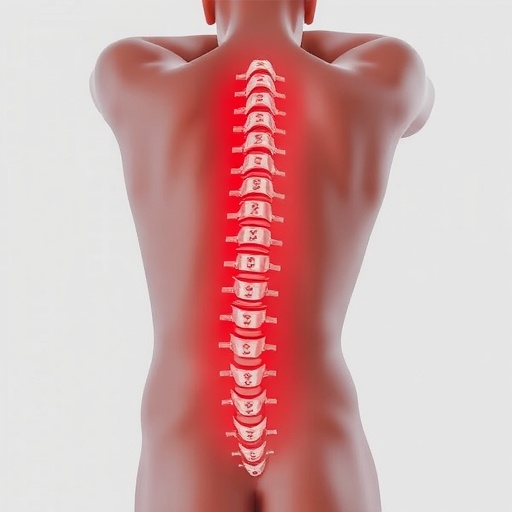Chronic sciatica, a condition that often embodies the pervasive nature of pain and disability, has long challenged both patients and healthcare practitioners alike. Recently, an intriguing research article has emerged, elucidating the potential therapeutic benefits of acupuncture for individuals grappling with this often debilitating condition. The study, spearheaded by Konon and Fuest, serves as a cornerstone in understanding how alternative medicine techniques can potentially integrate into mainstream therapeutic regimens.
Chronic pain, particularly in the lower back and legs, typically associated with sciatica, can dramatically impair one’s quality of life. Individuals suffering from this condition often report persistent discomfort that limits their mobility and ability to engage in daily activities. Conventional treatments frequently involve medications, physical therapy, and in some cases, surgical intervention. However, the quest for a holistic and effective remedy has led many to explore complementary approaches, with acupuncture emerging as a popular option.
Acupuncture, a practice rooted in traditional Chinese medicine, involves the insertion of fine needles into specific points on the body to stimulate energy flow and promote healing. This ancient technique is thought to activate the body’s natural pain-relief mechanisms. The study in question meticulously investigates whether acupuncture can specifically alleviate the pain and functional disability experienced by patients with chronic sciatica.
The methodology adopted in this research was robust and well-structured. Participants were carefully selected based on specific criteria to ensure a representative sample of individuals suffering from chronic sciatica. They were then divided into groups receiving either acupuncture treatments or standard care. This randomized, controlled approach reinforces the findings and lends credence to the argument presented by the researchers.
Results from the study indicate that patients who underwent acupuncture reported significant reductions in pain levels compared to those receiving conventional treatment alone. The findings suggest that acupuncture may not only serve as a temporary relief for sciatica patients but could also instigate long-term benefits regarding pain management. Many participants in the acupuncture group indicated improved mobility and a better overall sense of well-being within a few sessions.
Interestingly, the study also highlights the psychological components of pain management. Chronic pain often leads to anxiety and depression, compounding the suffering experienced by afflicted individuals. The stress reduction associated with acupuncture treatments may, therefore, play a crucial role in its efficacy. By addressing both the physical and psychological aspects of chronic sciatica, acupuncture showcases the potential for holistic treatment strategies to emerge as viable alternatives.
As the research aligns with a growing body of evidence supporting alternative treatments, it raises intriguing questions about the role of acupuncture within healthcare settings. Healthcare practitioners are historically cautious regarding complementary approaches, particularly those lacking extensive scientific backing. However, the positive outcomes of this study could provide practitioners with the impetus to consider acupuncture as an adjunct therapy for their patients suffering from chronic sciatica.
Furthermore, the implications of this research extend beyond just sciatica relief. If acupuncture proves effective in managing pain and disability for one condition, could it serve similar roles for other chronic pain syndromes? The findings encourage a broader examination of acupuncture’s utility across diverse medical contexts. This could herald a paradigm shift in pain management strategies within contemporary medicine.
The increased interest in non-pharmacological therapies echoes broader societal shifts toward integrative healthcare. Patients are increasingly seeking alternatives to traditional medication, particularly amid growing concerns over opioid dependency and the side effects associated with long-term drug use. This transition towards more holistic modalities is exemplified by the enthusiastic reception of acupuncture and other complementary therapies among patients.
Moving forward, additional research will be essential to explore the optimal protocols for acupuncture treatment. Questions regarding the frequency of sessions, duration of effects, and the specific points best suited for sciatica remain critical avenues for investigation. Future studies could also delve into the synergetic effects of combining acupuncture with other treatment options, further enriching the mosaic of chronic pain management strategies.
In conclusion, the research led by Konon and Fuest offers a compelling narrative about the potential benefits of acupuncture for patients battling chronic sciatica. Their findings not only illuminate a promising alternative pain management option but also advocate for a deeper exploration into the integration of holistic practices within contemporary medical frameworks. As acupuncture gains recognition in the realm of evidence-based medicine, it has the potential to provide relief to countless individuals, potentially transforming the management of chronic pain.
In summary, this exploration of acupuncture highlights a pivotal moment in the evolution of pain management approaches. With growing interest among both patients and healthcare providers, acupuncture could lead the charge towards a more comprehensive and effective approach to treating conditions that have long resisted conventional cures. The harmony between traditional practices and modern medical standards may hold the key to brighter, pain-free futures for many.
Subject of Research: Acupuncture for Chronic Sciatica
Article Title: Patients interested in Acupuncture for Chronic Sciatica may find it Reduces Pain and Disability.
Article References:
Konon, E., Fuest, S. EBM BLS: Patients interested in Acupuncture for Chronic Sciatica may find it Reduces Pain and Disability.
J GEN INTERN MED (2025). https://doi.org/10.1007/s11606-025-09762-6
Image Credits: AI Generated
DOI: 10.1007/s11606-025-09762-6
Keywords: Acupuncture, Chronic Sciatica, Pain Relief, Disability, Alternative Medicine, Integrative Healthcare.




